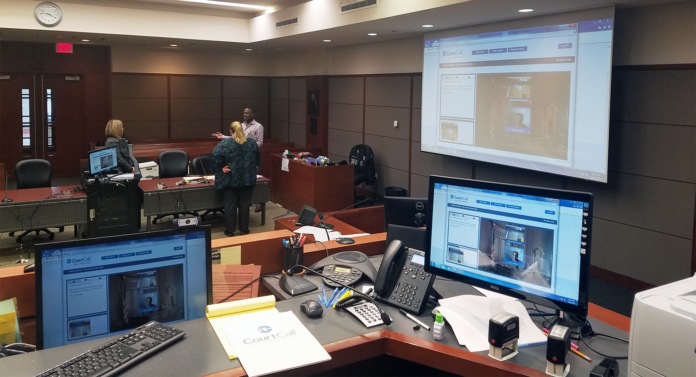“Mark had a one-minute court appearance down in the Orange County court, and it was an hour-and-a-half drive there and an hour-and-a-half drive back,” said Robert Alvarado, who along with Wapnick, ran a small law firm in West Los Angeles at the time. “He came back and said, ‘I could have done that over the phone. Why didn’t we?’”
That set Alvarado and Wapnick in search of a solution that would become CourtCall, which now employs more than 100 people and brings in about $40 million in annual revenue, according to Business Journal estimates.
The Westchester-based company has processed some 6 million remote court appearances since its founding in 1995, and the widespread adoption of its teleconferencing services by court systems nationwide will likely continue beyond the pandemic era.
“We’re not trying to suggest that everything should be done remotely, but so much can be, and the courts now appreciate that in a way that they didn’t before,” Alvarado said.
CourtCall’s business tripled as Covid-19 forced the courts to halt in-person proceedings. Instead of in the courtroom, many trials continued in virtual space, with the company providing tools for remote witness testimonies, mediations, arraignments and appearances before judges.
Its browser-based platform helped differentiate CourtCall from competitors like Zoom, Skype or Webex, which require software downloads and can create potential security issues.
CourtCall also provides various courtroom-friendly tools, including the ability to broadcast proceedings and sign documents in real time, submit fingerprints, or set up private meeting rooms for attorneys to consult with the judge or with their client.
The company’s technology can also facilitate remote appearances from jails via portable internet-enabled kiosks that are set up on demand. Several dozen courts across the country, including the U.S. District Court for the Southern District of New York, are using the kiosks for arraignment services.
“We’re built for the court,” Alvarado said. “We’re not for 5,000-people webinars, or for drinks with grandma. There’s space for that, but if you want serious business, we are the platform that accomplishes it.
“Picture us as being the UPS or United Airlines. UPS agrees to deliver your package on a certain day at a certain time, and United delivers your body on a certain day at a certain time. We deliver your voice or your image to a certain court at a certain time for a certain proceeding,” he added.
Alvarado and Wapnick started the business with loans from friends and family, which they were able to pay off within five years. At that point, they also quit their law practice.
“The transition wasn’t overnight,” Alvarado said. “While we knew we had a great product, it took a long time to get it off the ground.”
The company grew organically and via three acquisitions — Court Conference and Conference Call Service in the early 2000s and Telecourt about five years ago.
Andrew Waxler, co‑managing partner at Kaufman Dolowich Voluck in Brentwood, said his law office has been using CourtCall for the past couple of years to enable its lawyers to work remotely whenever possible.
“I think our ability to attract and maintain talented lawyers is directly tied to our flexibility in having a remote business model,” Waxler said. “While we certainly cannot take credit for predicting the pandemic, we were prepared when it hit.”
He said his team appreciates the security systems that are in place, “and the remote environment appears identical to what we would have experienced in person. … After six months of all remote appearances, it is obvious that remote appearances are here to stay.”

